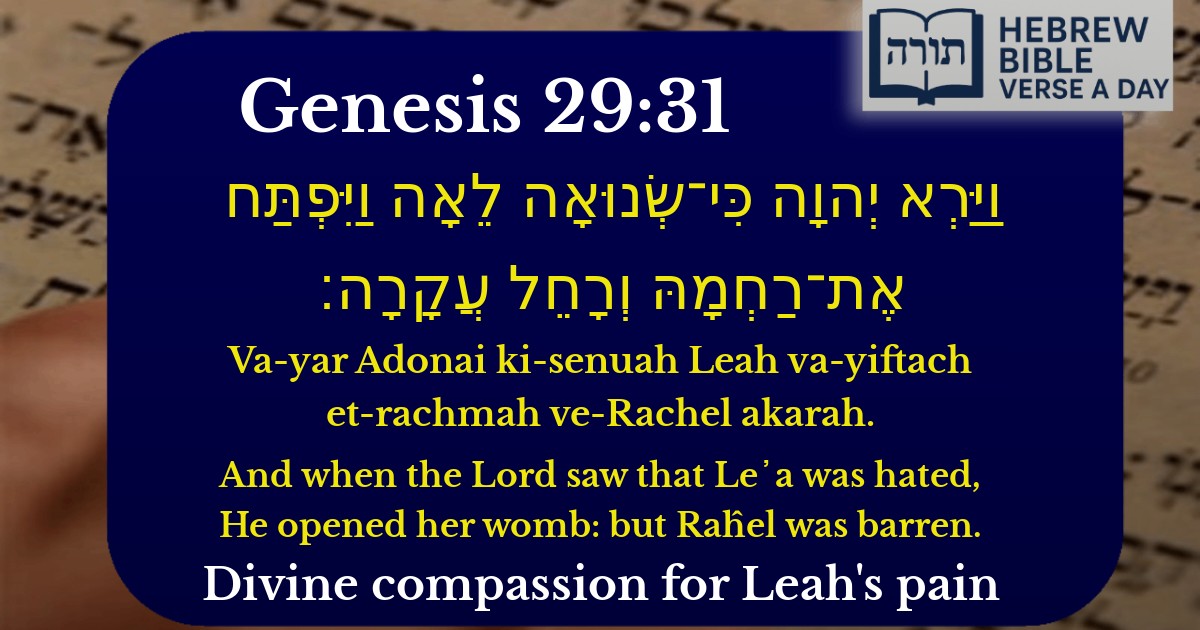Join Our Newsletter To Be Informed When New Videos Are Posted
Join the thousands of fellow Studends who rely on our videos to learn how to read the bible in Hebrew for free!
Hebrew Text
וַיַּרְא יְהוָה כִּי־שְׂנוּאָה לֵאָה וַיִּפְתַּח אֶת־רַחְמָהּ וְרָחֵל עֲקָרָה׃
English Translation
And when the Lord saw that Le᾽a was hated, He opened her womb: but Raĥel was barren.
Transliteration
Va-yar Adonai ki-senuah Leah va-yiftach et-rachmah ve-Rachel akarah.
Hebrew Leining Text
וַיַּ֤רְא יְהֹוָה֙ כִּֽי־שְׂנוּאָ֣ה לֵאָ֔ה וַיִּפְתַּ֖ח אֶת־רַחְמָ֑הּ וְרָחֵ֖ל עֲקָרָֽה׃
וַיַּ֤רְא יְהֹוָה֙ כִּֽי־שְׂנוּאָ֣ה לֵאָ֔ה וַיִּפְתַּ֖ח אֶת־רַחְמָ֑הּ וְרָחֵ֖ל עֲקָרָֽה׃
🎵 Listen to leining
Parasha Commentary
📚 Talmud Citations
This verse is quoted in the Talmud.
📖 Berakhot 60a
The verse is referenced in a discussion about divine providence and the opening of wombs, illustrating God's intervention in human affairs.
📖 Megillah 13b
The verse is cited in the context of discussing the merits and roles of Leah and Rachel, emphasizing divine justice and compassion.


Understanding the Verse in Context
The verse (Bereshit 29:31) describes Hashem's intervention in the lives of Leah and Rachel, the wives of Yaakov. The Torah states that Leah was "שְׂנוּאָה" (s'nu'ah), often translated as "hated," but Rashi clarifies that this does not mean actual hatred. Rather, it means that Leah was "less beloved" compared to Rachel, whom Yaakov initially intended to marry. The Midrash (Bereshit Rabbah 71:2) explains that Leah felt secondary in Yaakov's affections, prompting Hashem's compassion.
Divine Compassion for Leah
Rashi emphasizes that Hashem saw Leah's distress and rewarded her with children first because of her suffering. The phrase "וַיִּפְתַּח אֶת־רַחְמָהּ" ("He opened her womb") demonstrates divine intervention based on justice and mercy. The Ramban (Nachmanides) adds that Leah's fertility was a direct response to her emotional pain, showing that Hashem hears the cries of the downtrodden.
Rachel's Barrenness
The contrast with Rachel's barrenness ("וְרָחֵל עֲקָרָה") is significant. The Talmud (Berachot 60a) teaches that Rachel's temporary infertility was part of a divine plan, allowing Leah to bear children first. The Midrash (Bereshit Rabbah 71:6) suggests that Rachel's later prayers (Bereshit 30:22) were answered in due time, demonstrating that divine timing is purposeful.
Key Lessons from the Verse